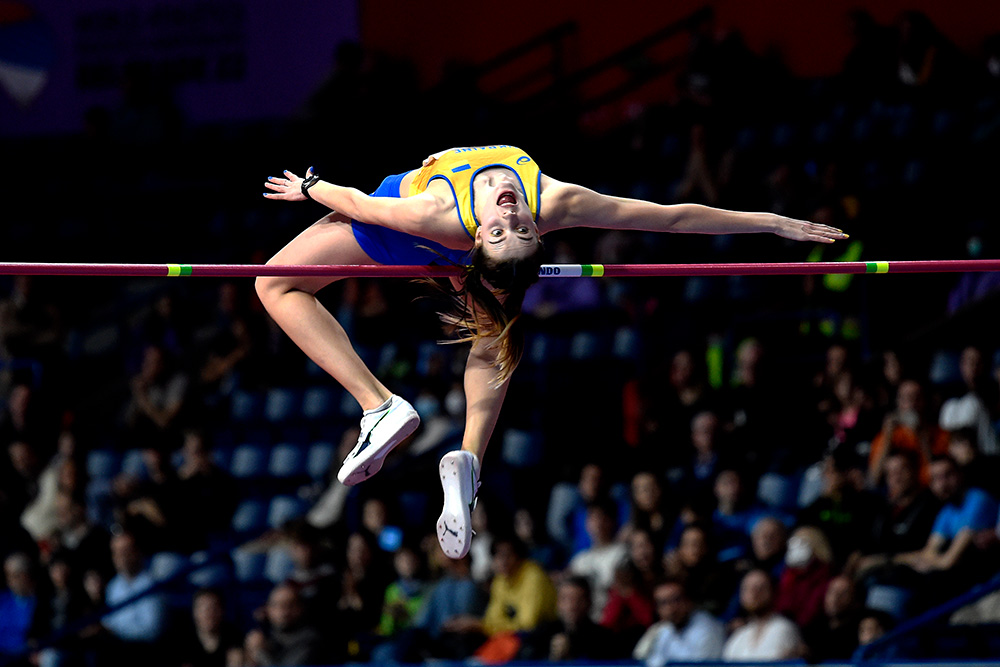
UKRAINE HAS HAD little to celebrate since Russia’s Vladimir Putin sent his tanks and soldiers over the border and invaded his neighbor on February 24, but Yaroslava Mahuchikh’s World Indoor HJ gold marked a brief moment for her compatriots to rejoice.
Mahuchikh’s story of how she got to Belgrade, following a 3-day, 1300M (c2000km) road trip from her home city of Dnipro, through Moldova and then Romania before arriving in Serbia made headlines on the eve of the champs.
Events in her home country also meant that the reigning WC silver medalist and ‘OG bronze medalist, who is still just 20, was the popular favorite in Belgrade.
But no one, not least Mahuchikh, knew what toll the war had taken on her mental and physical state in a championships setting.
However, she rose to the occasion in so many ways, clearing a list-leading 6-7½ (2.02) to elicit one of the loudest receptions of the 3-day event once her gold medal had been confirmed, perhaps only topped by the cheers which greeted the victory on the final evening by local long jump star Ivana Vuleta.
“No matter how hard we tried to concentrate on preparing for the competition, it was difficult,” Mahuchikh reflected in the days after her win.
“My coach Tetyana Stepanova and I followed the news all the time. Even when we were at the Championships, a bomb fell on the theater in Mariupol, where 1500 people were hiding, where in front of the building the word ‘Children’ was written in large letters, which could be seen from the air. How can anyone commit such horrors?”
Despite all the tragic distractions, Mahuchikh remained motivated to keep the Ukrainian flag flying in the global sporting arena.
“Tetyana, as always, helped and supported me, she found the right words for me to focus to the competition. She said that despite everything that was happening at home, we need to keep it together and show the results of what we had been working towards until February 24. I wanted to jump higher than 2m [6-6¾], because this season I had not cleared that height; and I succeeded.”
Indeed, 6-8¼ (2.04) might even have been possible but for the fact that the tape marking her runup got scuffed up during her attempt at 6-7½ (2.02) and she had to hastily remeasure her approach.
“But I was motivated by the fact that I am from Ukraine. When I was lying 3rd and then 2nd in the competition [after her clearances at 6-6 and 6-6¾ but with fouls to her name], my head was spinning all the time: ‘No, I must win for Ukraine. We need a gold medal,’ I said to myself. I knew it was going to be very important for the whole country.
“It is also very nice that so many people supported us. In particular, [Australia’s silver medalist] Eleanor Patterson.
“In the call room, I saw that she had a yellow heart painted on a blue background [brushed on to Patterson’s fingernails]. When we were later photographed with the flags, she said she did it to show that Australia supports Ukraine,” added Mahuchikh, visibly moved by the way the crowd and her fellow competitors embraced her and her country.
Not surprisingly, post-Belgrade Mahuchikh’s plans for the future are in still limbo.
After the WIC, she and Stepanova traveled to Germany to meet with her sponsors Puma. The pair stayed there for several days before moving on to spend a month in Turkey at a training camp.
If, as currently seems likely, the war persists, Mahuchikh will be unable to return home — although most of her family remains there and she is in stressful contact with them almost every day — and it is likely she will go back to Germany.
One thing is certain in Mahuchikh’s life and that is her unambiguous support for the ban on Russian athletes, including reigning Olympic champion Mariya Lasitskene.
This is despite the fact that the pair get on reasonably well – they were photographed conversing and celebrating together after the Tokyo final which caused considerable controversy in Ukraine amidst the rising tensions last fall — and Lasitskene’s forthright statements in the past about the state of Russian sport suggest she is no pro-Putin puppet.
“I think World Athletics made the right decision because Russian athletes must understand that Russia started the war and a lot of Russians supported it,” commented Mahuchikh.
“We shouldn’t have to compete when our people and children are being killed by the Russian military, it’s terrible. They must understand that Russia started the war, they were the aggressors.
“It’s really terrible to see them [high profile Russian sports personalities] at rallies. Some have asked in the media what the problem is. I think a lot of them don’t understand what has happened.”
Before July’s outdoor World Champs, there is also the Diamond League beckoning. The women’s high jump doesn’t get contested until the third meeting in this year’s series, which is Pre on May 28, and that could be Mahuchikh’s return to competition.
One of her rivals could potentially be Patterson and arguably the best tribute to Mahuchikh’s emotional triumph in Belgrade came from the Australian.
“My heart goes right out to them [Mahuchikh and teammate Iryna Herashchenko, who finished 5th]. Everything they’ve been going through, it’s incredible that Yaroslava has come here and competed so well. I painted my nails blue and yellow for her. I am just so happy for her, as an athlete and an incredible person,” said Patterson at the post-event press conference, reflecting on her own special bond with Ukraine as it was there in Donets’k 9 years ago that she won the World Youth (U18) title.